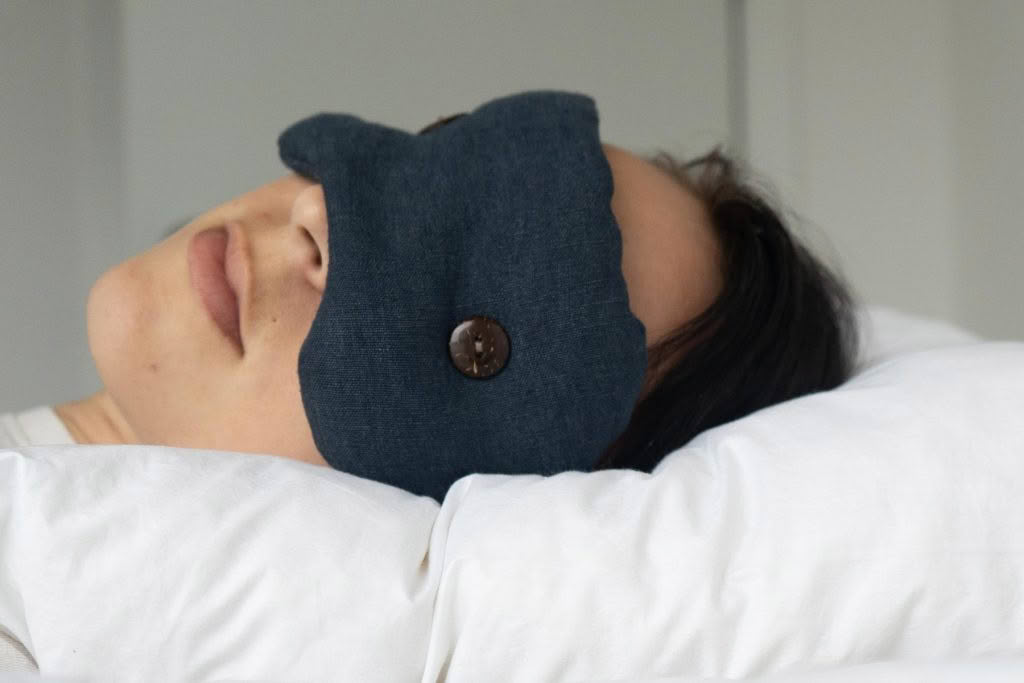Improve your sleep
Words Shaz Andrew, Naturopath and Holistic Nutritionist from Hana

Weighted Eye Mask, $75, kindface.co.nz
During the deeper stages of sleep, certain hormones are released that stimulate collagen synthesis, which helps improve our skin integrity, the health of our joints and the integrity of our gut lining. The glymphatic system – the brain’s lymphatic system or waste clearance system – only becomes active when we are sleeping. So, poor sleep can also contribute to a build-up of toxins in the brain that are damaging to our neurons.
Creating better habits around sleep/wake times can be a helpful way to improve sleep quality. But there are a number of other dietary and lifestyle recommendations that can improve the way we sleep.
Incorporate glycine-rich foods
Glycine is an amino acid abundantly found in foods rich in collagen – including cartilaginous cuts of meat, bone broth, gelatin and eggs. Glycine stimulates the production of serotonin, involved in the production of melatonin and sleep regulation. Studies have shown that boosting glycine improves sleep quality and reduces symptoms of insomnia.
Eat more carbohydrates in the evening
The brain needs the amino acid tryptophan to produce neurotransmitters melatonin and serotonin which are involved in regulating our sleep/wake cycles. We get tryptophan from eating protein, however carbohydrates are actually required to increase the uptake of tryptophan by the brain. Eating a meal that is rich in complex carbohydrates such as root vegetables and wholegrains a few hours before bedtime boosts tryptophan levels in the brain and the production of sleep-inducing neurotransmitters.
Increase your magnesium levels
Magnesium can help to alleviate stress and anxiety due to the calming effect it has on the nervous system. It also relaxes tightness and tension in our muscles. A number of studies have shown that those suffering from insomnia have low magnesium levels and that increasing magnesium through diet and supplementation improves sleep quality and can be used as a treatment for insomnia.
Go to bed and wake up in sync with natural light cycles
When we are only exposed to natural light, like when we go camping, our circadian rhythm (sleep/wake cycle) naturally becomes synchronised to sunrise and sunset. This helps us to stay awake during the day and go to sleep when it becomes dark. Exposing your eyes to bright daylight first thing in the morning and throughout the day (without sunglasses) also helps to reset the circadian rhythm and increase melatonin release in the evening, supporting sleep.
Restrict your exposure to blue light at night
Electronic devices with screens such as laptops, smartphones, tablets and TVs and the lighting in our homes emit artificial light, high in blue light. Blue light disrupts our circadian rhythm by impacting the production of melatonin. While it is impossible to completely avoid exposure to artificial blue light, there are ways we can reduce our exposure:
- – Use a blue light blocking filter like f.lux on your computer screen at all times
- – Avoid using screens at least two hours before bedtime
- – Reduce the backlighting on your phone and set up night mode to switch on automatically
- – Invest in a pair of blue light blocking glasses, or if you already wear glasses, add a blue light blocking filter next time you’re due for a lens change
- – Use low lighting in the evening or blue-blocking light bulbs
- – Make your bedroom as dark as possible by using blackout curtains or an eye mask and switching off any light-emitting devices, for example alarm clocks.
Having spent a decade working as a pharmacist, Hana founder Sara Higgins has a deep insight into the personal responsibility required for good health. Hana is about providing a calm and beautiful environment in which to release, replenish and restore her clients’ health – feeding wellbeing so it can flourish into wellness. hana.nz

